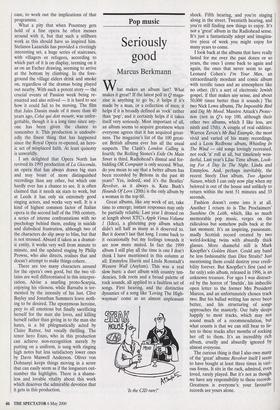Pop music
Seriously good
Marcus Berkmann
What makes an album last? What makes it great? If the latest poll in Q maga- zine is anything to go by, it helps if it's made by a man, or a collection of men; it helps if it is broadly defined as 'rock' rather than 'pop': and it certainly helps if it takes itself very seriously. Most important of all, an album seems to acquire greatness when everyone agrees that it has acquired great- ness. The magazine's list of the 100 great- est British albums ever has all the usual suspects. The Clash's London Calling is fourth; the Rolling Stones's Exile On Main Street is third. Radiohead's dismal and for- bidding OK Computer is only second. What, do you mean to say that a better album has been recorded by Britons in the past 40 years? Yes, indeed, and it's the Beatles' Revolver, as it always is. Kate Bush's Hounds Of Love (20th) is the only album by a woman in the top 60.
Great albums, like any work of art, take time to emerge; instant responses may only be partially reliable. Last year I droned on at length about XTC's Apple Venus Volume I (Idea), a glistening pop album which didn't sell half as many as it deserved to. But it doesn't last that long. I come back to it occasionally but my feelings towards it are now more muted. In fact the 1999 album I still play all the time is one I don't think I have mentioned in this column at all: Emmylou Harris and Linda Ronstadt's Western Wall (Asylum). This was a real slow burn: a duet album with country ten- dencies, folk roots and a broad palette of rock sounds, all applied to a faultless set of songs. First hearing, and the distinctive dynamics of a song like 'Loving The High- wayman' come as an almost unpleasant Is the CJD rare?' shock. Fifth hearing, and you're singing along in the street. Twentieth hearing, and you're still finding new things to enjoy. It's not a 'great' album in the Radiohead sense. It's just a fantastically adept and imagina- tive piece of work you might enjoy for many years to come.
I look back at the albums that have really lasted for me over the past dozen or so years, the ones I come back to again and again, the ones that never seem to age. Leonard Cohen's I'm Your Man, an extraordinarily mordant and comic album with terrific tunes and an atmosphere like no other. (It's a sort of electronic Jewish gospel, if that makes any sense, and about 50,000 times better than it sounds.) The two Nick Lowe albums, The Impossible Bird and Dig My Mood. Massive Attack's Protec- tion (not in Q's top 100, although their other two albums, which I like less, are ninth and 15th). A couple of real oddities: Warren Zevon's Mr Bad Example, the most vivid and varied of his many recordings, and a Leon Redbone album, Whistling In The Wind — old songs lovingly recreated, not rock 'n' roll at all, but timelessly won- derful. Last year's Lilac Time album, Look- ing For A Day In The Night. Linda and Emmylou. And, perhaps inevitably, the recent Steely Dan album, Two Against Nature, which I can only now play when my beloved is out of the house and unlikely to return within the next 51 minutes and 33 seconds.
Fashion doesn't come into it at all. Another I return to is The Proclaimers' Sunshine On Leith, which, like so much memorable pop music, verges on the ridiculous but somehow pulls back at the last moment. It's an inspiring, passionate, madly Scottish record created by two weird-looking twins with absurdly thick glasses. More shameful still is Mark Knopfler's Golden Heart. Could any band be less fashionable than Dire Straits? Just mentioning them could destroy your credi- bility forever. But Knopfler's first (and so far only) solo album, released in 1996, is an unknown treasure. For ages I was distract- ed by the horror of 'Imelda', his imbecilic open letter to the former Mrs President Marcos, and an unfortunately chosen track two. But his ballad writing has never been better, and his structuring of songs approaches the masterly. Our baby sleeps happily to most tracks, which may not sound much of a recommendation, but what counts is that we can still bear to lis- ten to these tracks after months of rocking her off to them. It's an incredibly rich album, cruelly and absurdly ignored by almost everyone.
The curious thing is that I also own many of the 'great' albums: Revolver itself I seem to have bought at least three times in vari- ous forms. It sits in the rack, admired, even loved, rarely played. But it's not as though we have any responsibility to these records. Greatness is everyone's: your favourite records are yours alone.


































































 Previous page
Previous page